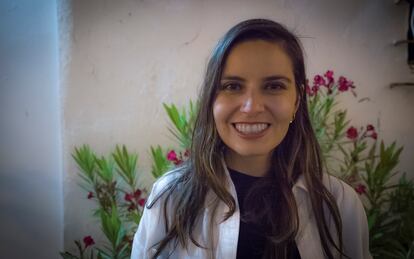Yahya’s return home: $3,500 and a coffin full of broken dreams
In the short documentary ‘Until He’s Back,’ Jacqueline Baylon describes the obstacle course that a Moroccan family goes through to recover the body of their son, who drowned when he was trying to reach Spain. The Mexican filmmaker emigrated to the United States at the age of six, crossing the Rio Grande with her mother


“It makes perfect sense that this interview takes place here, in front of the sea, looking at Morocco,” says Jacqueline Baylon, in a café in Tarifa, Spain’s southernmost port, which is just eight miles away from the North African country.
This Mexican journalist, born in Chihuahua, Mexico in 1988, has just presented her first documentary. Until He’s Back premiered at the Festival of African Cinema (FCAT), held this past May in Tarifa, in Cádiz province. The short film describes a little-known aspect of migration: the repatriation of the bodies of those who die while trying to reach Europe.
The protagonist of her film is Ahmed Tchiche. He’s a Moroccan citizen who, over the course of a year, fights against an endless bureaucracy to be able to recover the remains of his son, Yahya, whose body appeared on a beach in Murcia in 2022. Ahmed wants to bury his son near the family home, in the city of Oudja. “Until he comes back, we won’t be okay,” the grieving father says, in the first minutes of the documentary.
Baylon, who currently lives in Spain, has been researching and writing about migration for years. This drama touches her very closely. At the age of six, she and her mother crossed the Rio Grande and arrived clandestinely with her mother in El Paso, Texas, where she grew up. “When you cross a river, the police chase you and they throw you out of a place, even if you’re a little girl, it marks you forever,” the director notes.
Question. Where did the idea for this documentary come from?
Answer. It all started when I was reading a profile about Martín Zamora, an embalmer who works in the Algeciras area (a city in the southern region of Andalucia). He’s taken care of dozens of corpses of Moroccan migrants, who couldn’t fulfill their dream of arriving in Spain. That care and respect for those who have died caught my attention and I began to visualize the documentary. I got the support of Scripps News television, the media company I work for, and we started filming scenes with him, while keeping in mind that the central theme had to be a family that was looking for a son or a brother, because they want to say goodbye.
Q. And how did you reach Yahya’s family?
A. We contacted NGOs that help families locate their missing loved ones. And we were filming in Morocco when three bodies washed up in Murcia. One of them was Yahya’s. From that moment, we spent a year accompanying his father. It was a gamble, because we didn’t know how things were going to end up and if he would manage to repatriate the body of his son. Because [the families] don’t always succeed: many deceased migrants end up cremated or buried in Spain. The road for families is full of obstacles.
Q. The tragedy faced by the Tchiche family serves to describe the magnitude of the migration crisis in this area.
A. Yes, that’s why the images that describe the path to repatriate Yahya’s body alternate with the rescue of a boat with several dozen migrants, which we were able to record together with the NGO Open Arms. I thought that was important to show.
Q. Is there any image from the filming that particularly impacted you?
A. When the family is waiting for the car with the boy’s coffin to arrive at the house, so that the women can watch over it for a few hours. There were some young people who were there to say goodbye to the deceased and they talked among themselves about the possibility of hiding in the car, which was returning to Spain, and fleeing [Morocco]. Everyone wants to leave: they think about it all the time, even at a funeral. And, while filming, I was also surprised by the business of repatriating bodies, which costs about €3,500 ($3,800)... an enormous amount for these mostly poor families. With the aggravating factor that the boys who die have already paid between $3,000 and $5,000 to get on a boat.
Q. Migration is an issue that you’ve experienced firsthand, because you also had to leave Mexico and start from scratch — and undocumented — in another country.
A. All of this touches me very closely. When I was six years old, I clandestinely crossed the Rio Grande with my mother. We paid a coyote (a human-trafficker), because she wanted to give me a better life. We arrived in El Paso. Several times, we were caught by the immigration police and deported… but all that happened before September 11, 2001. Back then, it was easier. You could pay someone $100 and cross again. Now, it costs $10,000 to cross that border, it’s crazy.
Q. Since then, you’ve lived in the United States.
A. Yes, by the time I was nine years old, we had already legalized my situation. But when you cross a river, the police chase you and they throw you out, even if you’re a little girl, that marks you forever.
I remember one time that the immigration agents were looking for us and several families. My mom and I hid in a parking lot. My mother started to check if there were any unlocked cars and she finally found one… but inside, there was a woman, who panicked when she saw us. I also started crying out of fear and my mother tried to calm us both down, so they wouldn’t discover us.
Q. Have any of those personal experiences been captured in your film?
A. Yes. There or here, in the Strait of Gibraltar, migrants don’t always want to leave home. We don’t want to leave friends, family, our customs, our food... but it’s done out of necessity. Many people forget that.
Q. Your documentary premiered in the United States, where it won the award for Best Short Documentary at the Big Sky Documentary Film Festival, in Montana. How has the film been received in Europe?
A. In the United States, it has been very well received, but I’m surprised that, in Europe — and more specifically, in Spain — it hasn’t aroused much interest so far. It’s been rejected at several festivals and this surprised me, because it’s a story that, in my opinion, should be told.
Q. Has the Tchiche family seen the film?
A. Yes, they’ve seen it and they felt very respected and represented. It’s what the father wanted and it touched my heart that they allowed us to reach so deep, that they allowed us to record such tender family moments.
Q. Do you already have another documentary in mind?
A. I would like to tell the story of my Mexican family, who live in Ciudad Juárez. But I still don’t know how. My mother has eight sisters and they’re all there. I have some cousins who’ve been coyotes and I wanted to tell their story: how someone decides to work in [that field] without necessarily being a bad person, just because they have to eat and it’s difficult to find a job there.
Translated by Avik Jain Chatlani.
Sign up for our weekly newsletter to get more English-language news coverage from EL PAÍS USA Edition
Tu suscripción se está usando en otro dispositivo
¿Quieres añadir otro usuario a tu suscripción?
Si continúas leyendo en este dispositivo, no se podrá leer en el otro.
FlechaTu suscripción se está usando en otro dispositivo y solo puedes acceder a EL PAÍS desde un dispositivo a la vez.
Si quieres compartir tu cuenta, cambia tu suscripción a la modalidad Premium, así podrás añadir otro usuario. Cada uno accederá con su propia cuenta de email, lo que os permitirá personalizar vuestra experiencia en EL PAÍS.
¿Tienes una suscripción de empresa? Accede aquí para contratar más cuentas.
En el caso de no saber quién está usando tu cuenta, te recomendamos cambiar tu contraseña aquí.
Si decides continuar compartiendo tu cuenta, este mensaje se mostrará en tu dispositivo y en el de la otra persona que está usando tu cuenta de forma indefinida, afectando a tu experiencia de lectura. Puedes consultar aquí los términos y condiciones de la suscripción digital.








































